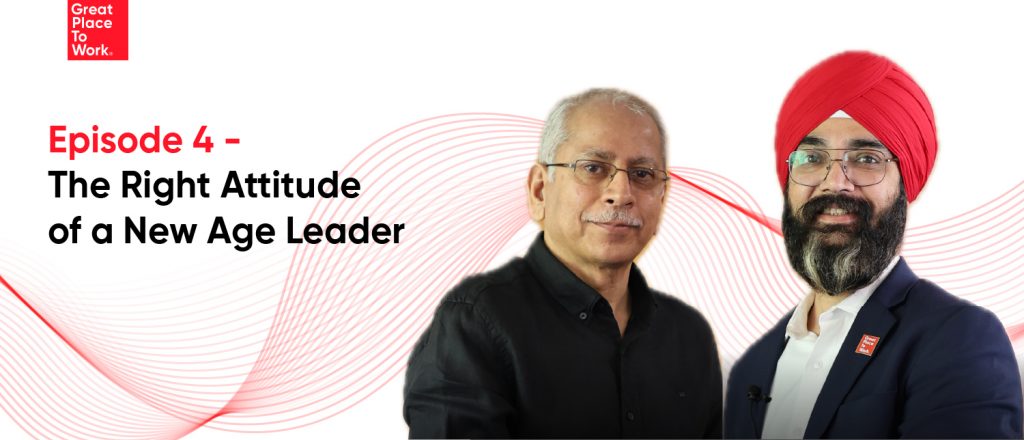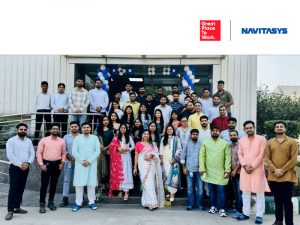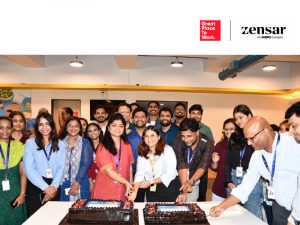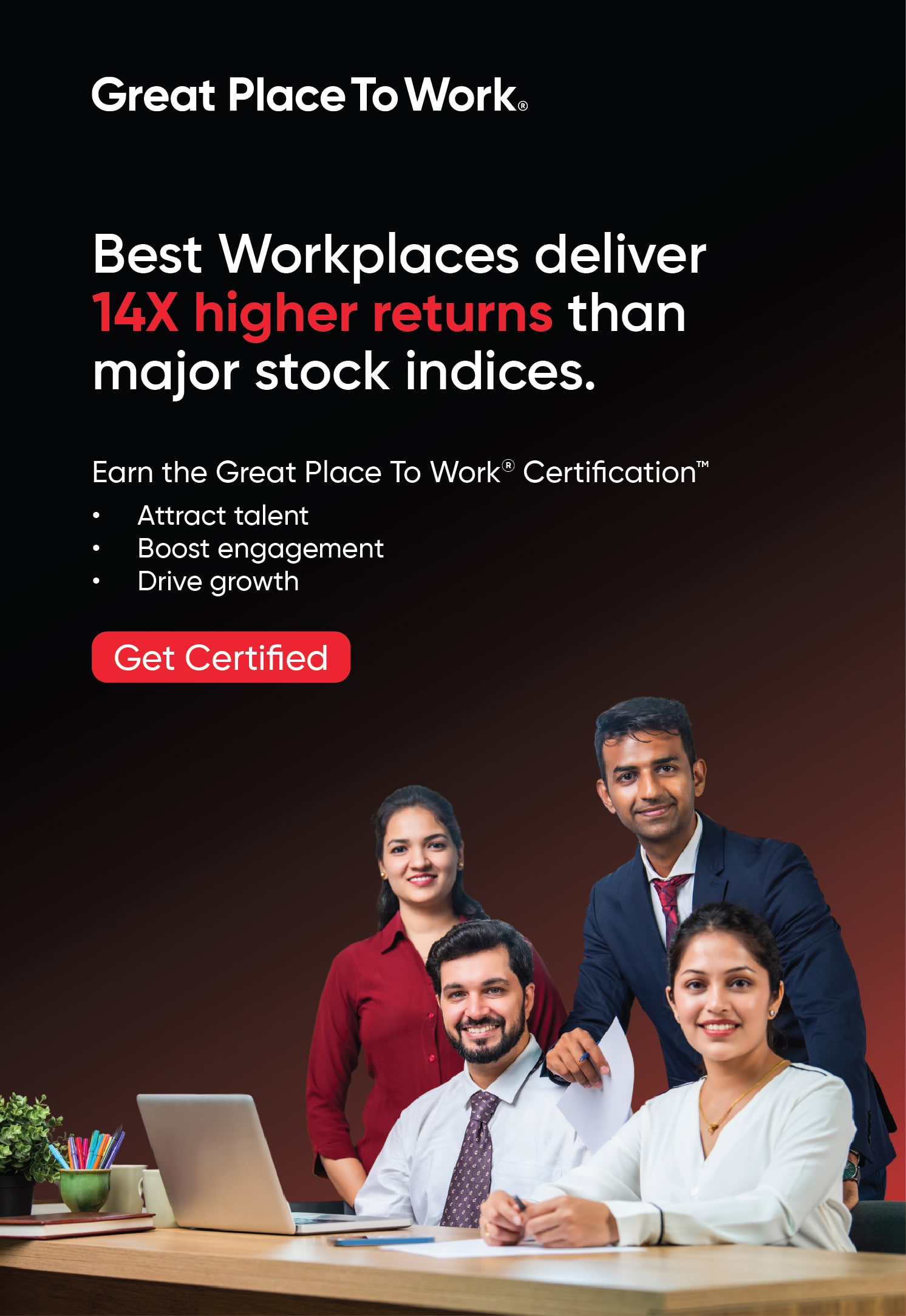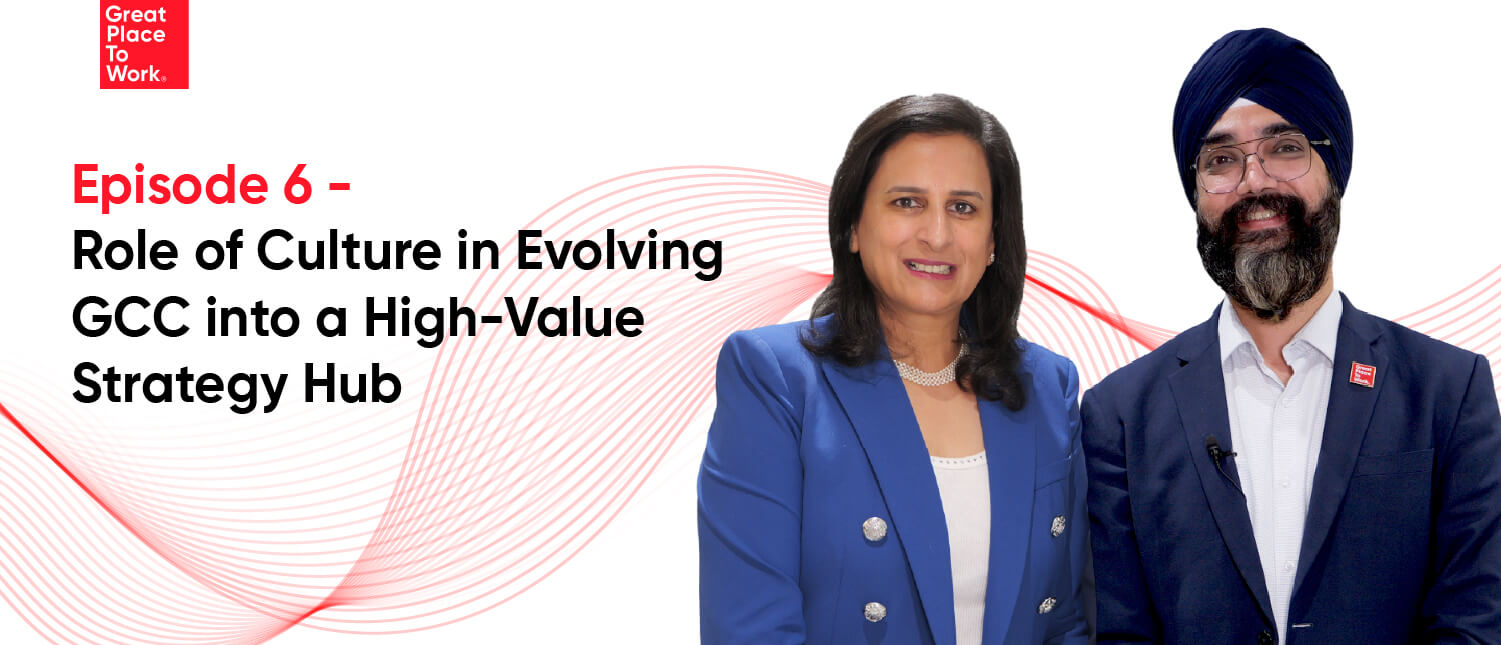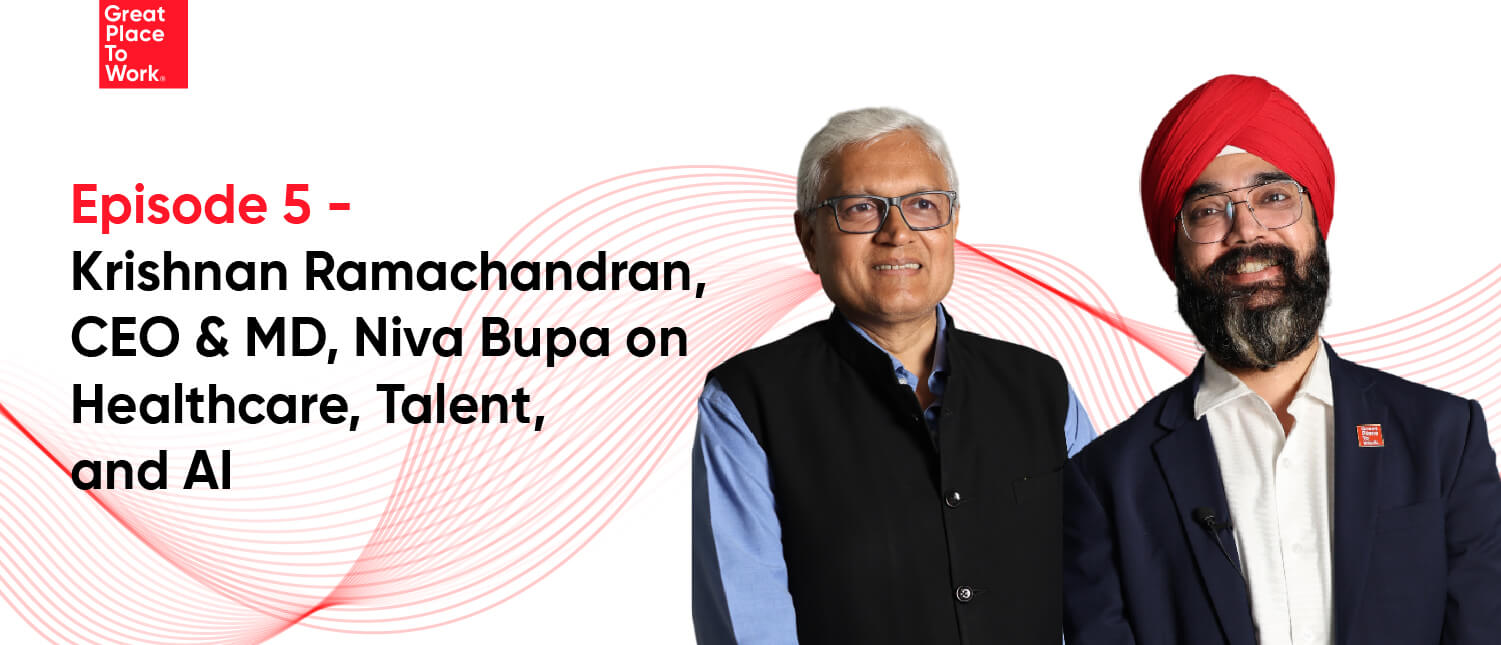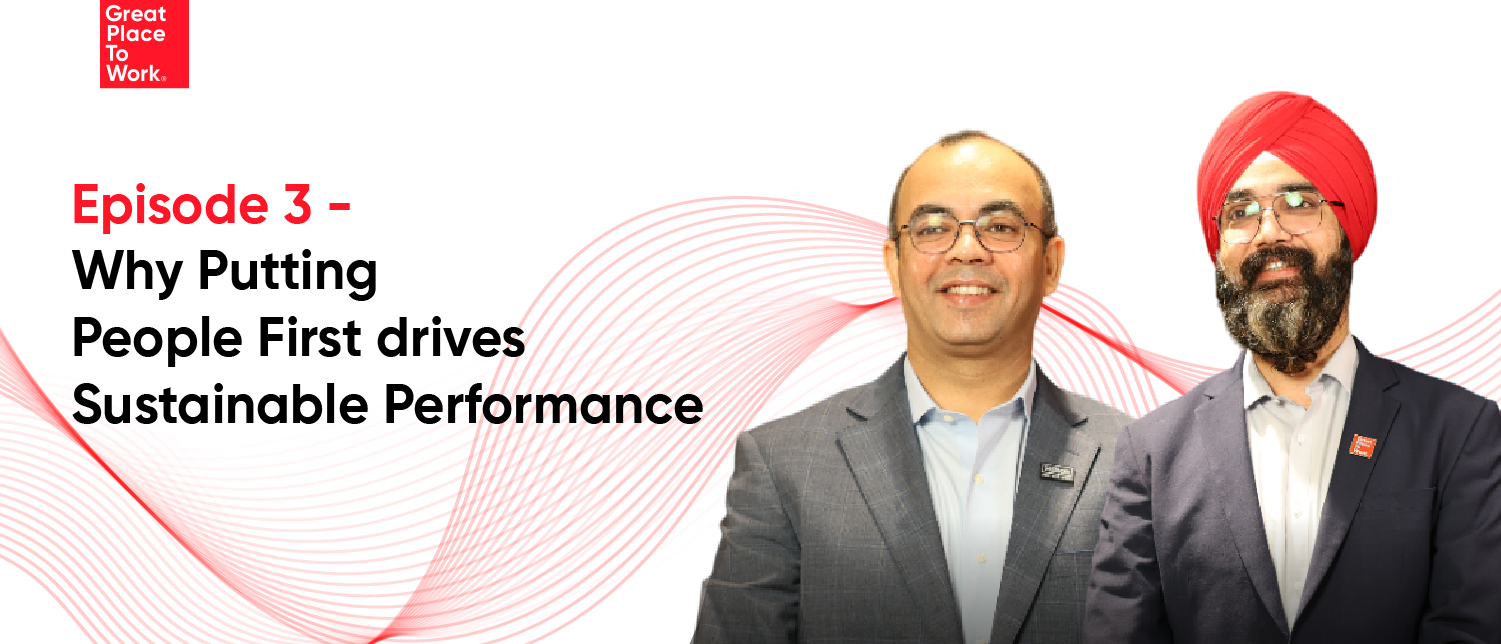In an age where artificial intelligence and technology are rewriting the rules of business, there stands a leader who believes in something timeless — the art of storytelling. In his journey, storytelling has not only been a powerful tool for connecting with teams and consumers but has also played a pivotal role in shaping his leadership style, inspiring others, and mentoring the next generation of future leaders with purpose and clarity.
In this episode of the For All Podcast by Great Place to Work® India, Balbir Singh, CEO of Great Place to Work® India, sits down with Harit Nagpal, the CEO of Tata Play, for an insightful conversation on leadership, culture, and the human side of business.
From a First Job to Leading A Company
Harit’s story is as inspiring as it is humble. A young boy from a small village in Uttar Pradesh, he went on to build a career, leading brands like Vodafone, PepsiCo, and Shoppers Stop. With a diverse background spanning sales, exports, and operations and a core strength in marketing- Harit embodies the idea that being a “jack of all trades, master of none, but oftentimes better than master of one” can be a powerful asset. His journey is a testament to the value of hard work and persistence, shaping him into the dynamic and effective leader he is today in the corporate world.
Work Culture Over Just “Culture”
One of the most powerful takeaways from Harit’s philosophy is the distinction between culture and work culture.
“Leaders create experiences, experiences create culture, and culture drives business performance.”
According to Harit, many organisations confuse culture with values. While values are non-negotiable and provide direction, work culture is what binds people together. It’s the everyday actions, collaborations, and choices that push everyone toward the larger organisational goal.
He simplifies culture into three powerful words that every CEO should live by: Collaborate, Experiment, and Ownership.
Listening gives the right solution
When asked how businesses can truly differentiate themselves in the market, Harit’s answer was clear — it all begins with people.
Leaders must deeply understand two groups: the customers who use their products and the employees who build them. Technology alone cannot guarantee success. What matters is listening to what people need, solving real problems, and creating experiences that make life easier.
This is why Harit emphasises the importance of direct connection. Meeting customers, engaging with teams, and consistently checking what the market demands help shape products and services that truly stand apart.
Breaking Walls, Building Trust
Harit strongly advocates for breaking down silos inside organisations. He believes that the infrastructure and environment in the office should be built on openness and collaboration.
He believes in mixing teams – letting marketing sit with operations, finance with design — because innovation often sparks when different minds collide. Disagreements and debates, when nurtured in the same room, become opportunities for growth and understanding.
The Attitude of New-Age Leaders
For Harit, leadership is not defined by titles but by attitude. A leader’s outlook towards everyday hurdles sets the tone for the entire organisation.
Positivity, openness to experimentation, and self-awareness are qualities that matter far more than control. In fact, these are the skills Harit personally looks for in a leader when hiring one. Leaders don’t need to announce their authority – their work, ideas, and the impact they create should speak for themselves.
Harit Nagpal’s insights offer a refreshing reminder that in a rapidly evolving business world, timeless values like authenticity, collaboration, and empathy still lead the way. His leadership journey is a testament to the power of staying grounded while aiming high. If you want to know more about his leadership journey, learn from his experiences, and are keen to learn what truly makes Tata Play a great workplace, tune in to the For All Podcast by Great Place to Work® India now.
Show Transcript
Balbir Singh: 0:00
Hello and welcome to the For All podcast by Great Place to Work India. I am Balbir Singh, CEO of Great Place to Work in India and your host for the day Today. I have the pleasure of welcoming Harit Nagpal. Harit is a CEO of Tata Play and he has been at the helm of the affairs for more than a decade. We’ll learn from him and just share some thoughts on what makes Tata Play a great place to work and also an organization that has gone through multiple changes. You know with the advent of OTT and how that has impacted. You know the way you run your business. So, harit, before we go into our conversation, tell me something that only you can tell. You know I can Google Harit Nagpal and know a lot of things about you your LinkedIn profile when you joined, your four decades of experience but tell us something you know, what got you here that only you can tell us and some brief about your intro and bio.
Harit Nagpal: 0:58
Well, the intro and bio is available on LinkedIn, so anybody can check out from there so anybody can check out from there.
Harit Nagpal: 1:07
But yeah, I people of my generation really uh, grew up in an india which was not as affluent as it is today. You know, when I was growing up you were either middle class or lower middle class. There was even the term upper middle class was restricted to a very few people. So I remember very well, you know. So half my schooling was in a small town called rudki in up, which at that time had a population of 50 000 okay, and 50 000 is a village today. And uh, the other half was in delhi, a large town. So I experienced both of those while growing up.
Harit Nagpal: 1:45
And that era, you know, every 10th home probably had a TV, every 20th home probably had a refrigerator and every 30th home probably had a landline phone. So the thing was that if it was a Sunday evening Doordarshan movie, then the two homes in your lane which you lived in, all the kids in the lane, would go and flock in those two homes and watch the film. If, on a summer afternoon, you felt thirsty and you felt hot, the one home in your lane that had a refrigerator was happy to offer you ice if you wanted it, to all the other 20 homes and the one home that had a phone was happy to host calls incoming calls for people who had people living overseas or outside the city. So that was the kind of community we lived in. If there was a wedding in the same lane, then almost everybody’s bedroom spare bedroom was used for the guests who came in from outside.
Harit Nagpal: 2:52
Our vacations are not to exotic places or to hotels. We went to our relatives’ places and our relatives came to our place. So we were like relatives, airbnb kind of relatives, airbnb kind of, so net-net. We grew up in a very collectivist kind of not very individualistic like we live in today. Our generations growth was at least in a very collectivist, and especially if you lived in a smaller town, that kind of thing. So you you learned the art of, or the benefits of, collaboration very early in life. One man alone cannot run a house. A village can run a house.
Harit Nagpal: 3:32
You know, grow you up and that’s, those are the kind of principles you came into the workplace also when you came in there and that’s helped. That’s helped become what we have become or make the companies that we worked for I think that reminds me of, uh, something my ex-boss used to tell me.
Balbir Singh: 3:55
You know, especially when you’re growing up in an environment like that exactly so when you cut that, I think.
Harit Nagpal: 4:15
I think that’s how you know. A lot of us have grown up and it will happen in everything. When a festival is celebrated together, when there are more community events that they hold in a week, then large buildings probably hold in a year. Yeah. So that feeling is still there in those places and kids who come out of those slums really are again going to be very collaborative when they grow up. Yeah. Unlike the Western individualistic kind of outlook that most of the buildings have.
Balbir Singh: 4:50
So, coming back from when you were growing up and to now that you are leading a big organization as part of the Tata Group, what are some of the things? One is collaboration group. Uh, what are the some of the things? One is collaboration. You know what are some of the things that you have carried through your journey of being a leader and what are some of the things and how have those impacted you in your journey as a leader?
Harit Nagpal: 5:16
yeah, so over the years, what has really changed is, uh, you know, when you started working? Strangely, I complete 40 years of work experience today. Oh okay, and without even a break of one week between the two jobs, any two jobs. Okay.
Harit Nagpal: 5:34
There’s been 40 continuous years of working and one has seen many winters in this process. So initially this country would have had either a concentration of licenses or technology or capital, or, by virtue of monopolies, ability to control the prices or ability to control the distribution. All those things have completely vanished now. There’s hardly any industry that is licensed, and even if it is licensed, license is available for a pittance to anybody who walks in. Technology is not restricted, it’s available to everybody.
Harit Nagpal: 6:21
If you have a half-baked business case, also you’ll have people wanting to fund you. Distribution is immense, online and offline. Both Price is equal to what the lowest competitor is charging, so none of these are you know unique advantages that anybody has. Then how do you differentiate in a market like this? How do you build a better brand which is liked by more people? I think it’s your understanding of people, people as customers and people within the organization that create the product, the quality, the brand that you create, and I think that’s the only differentiator you have, and that’s been my learning through the years of opening of India’s economy, and that’s what we focused on constantly. It’s about creating a culture within the organization that differentiates you and understanding the customer better and creating products and services for them, which they want, which solve their lives or problems they face in their lives, rather than just banking on technology to serve them through technology.
Balbir Singh: 7:35
We often say that it’s the leaders who create experiences. Experiences create cultures and cultures drive business performance, and that’s exactly what you’re telling.
Balbir Singh: 7:46
you told me exactly that, exactly in different words, exactly yeah, exactly, and that’s something I listen whenever I speak to any leader. That’s something we hear consistently, you know, reverberate across all the leaders. Doesn’t matter someone who has spent four decades in the business or someone who has spent, you know, four years in the business, uh, but when it comes to business performance, you know, and, uh, when it says depends on the culture, what are, what are those cultural principles that you have that you can swear by and see? You know, if there is a leader who is displaying those behaviors, then, if not now, later sometime or the later the day, the leader will be successful. He might be going through tough times right now, but what are some of the tenets that a leader displays that makes you confident about that leader? And you must have some of those leaders in your team also.
Harit Nagpal: 8:33
So culture is a very misused, misunderstood word. Yeah.
Harit Nagpal: 8:37
Very often cultures I’ve seen cultures confused with values Values are things that you must have. So when you go across to an organization and ask, okay, what’s the work culture? First of all, you can never, when it comes to an organization, you can’t use the word culture. You have to use the word work culture. Culture alone signifies something else. When you’re working in an organization with the purpose of building a company, a business with a good bottom line, then you have to have work culture to support that task. Work culture is something that binds people together to work towards the end goal of the organization. So therefore, an organization’s work culture, if it was to be defined in two, three, four words, would be those words which would galvanize people to work towards the end goal of the organization, the end objective of the organization. So that depends on what life stage of the industry life cycle are you in or are you at that time.
Harit Nagpal: 9:45
For example, we were very clear at Tata Play. We struggled with the work, culture, words for a long time and then we had a very reasoned out thought process of defining our three words and those for us, given where we were, was A collaborate, because we were in a tech-based, virtually delivered category which required collaboration between various functions from the time of inception to creation to delivery, and all these had to be involved all the time of inception to creation to delivery, and all these had to be involved all the time people couldn’t come in later yeah at some stage or because the canvas is wide open.
Harit Nagpal: 10:35
Unless you tried and failed you, there was no hope in life to fill that canvas well in time. So we said you need to experiment.
Harit Nagpal: 10:44
Fail fast and try new things after that, or you had to have ownership, because every time you ask somebody, okay, who’s in charge of this? Either no hand went up or three hands went up. Now three people can be driving a car, traveling in a car, but steering can’t be in. Yeah, the brakes can’t be under three feet, so there has to be one owner of a project. So, which is why we adopted our culture words were collaborate, experiment on, and then subsequently, we added speed to that. Okay.
Balbir Singh: 11:17
So we became CEOs all of us, from one to many.
Harit Nagpal: 11:20
From one to many. So these are our culture words and you and you can choose your culture words, but culture words are not words like honest or fair or these kinds of words or integrity.
Balbir Singh: 11:37
These are values our mothers taught them.
Harit Nagpal: 11:39
These are basics. You have to have them before you come to any organization.
Balbir Singh: 11:43
Yeah. So thought comes to my mind when you say CEO change to CEOs, does that also mean that’s how the organization is run? Like you have people who are accountable for their own businesses, the decision making sits with them, it’s all decentralized and they know what are the you know guardrails that are set, or how do you execute this organization? Is there one CEO sitting at the top, harit, dictating everything and saying this is how it should be done? Or you create a vision for the organization and then every CEO is responsible for meeting their organizational goals.
Harit Nagpal: 12:18
See those days of somebody dictating are over.
Harit Nagpal: 12:22
And they got over many, many decades ago. We lingered on with them. In some places we’re still lingering on with them, but you know it doesn’t work. Life is collaborative. Idea can come from any level. So, which is why you have to work in small teams and everything is project-based and every project has a, like you said, owner. Some days, a person three bands below you is an owner of the project and you have to. He has to lead that project group while everybody collaborates and contributes equally. And some days there is somebody who’s senior to you is a part of, is leading that group. So the leading is not done by rank. Leading is done by whose role, whose function, whose main role it is that the project group is fulfilling.
Harit Nagpal: 13:11
And another thing that has happened over the years is that uncertainties or disasters or disruptions don’t come with a notice. You don’t even know. For example, when COVID happened, could any one of us have ever imagined that there would be something called COVID? Spanish flu had happened about 100 years ago. Some of us had read about it in the books. I don’t think most people were aware of the fact. Also, could you have done some business continuity planning keeping COVID in mind? So when COVID happened and the organizations that were able to leap up and rise up to face it and respond to it were actually the ones which had lean, flat structure and empowered frontline and a collaborative culture who were able to respond culture who were able to respond and the ones who had a bureaucratic, multi-layered structure where the decisions are made only at the top and every small decision went all the way to the top and then got ratified and came down, probably waited for the vaccine to be invented before they could recover.
Harit Nagpal: 14:32
So that’s what it is. On an ongoing basis also, you have to have flat, lean structures, empowered frontline and a collaborative culture, and that’s how things are run.
Balbir Singh: 14:44
So, harit, you know I remember most of our disaster recovery and BCP plans had a lifespan of one day to one week. Nobody thought that we will have to go through something like a force major measure like this for years. But you know, when you create a culture where decision making happens at different levels and you define who are the owners, how do you create that feeling of safety net in your employees that you know if, even if I were to create a, make a mistake, I am the owner, I will not be held accountable. I will be held accountable but I will not be punished for making that honest mistake because an honest mistake, I was trying to do something good. So how do you create that culture of safety net in your employees?
Harit Nagpal: 15:27
so, when you when you define your culture as CEO, the middle frame there is experimenting. When we explain experimenting, you also say that if I have two people at the time of appraisal, one who’s achieved 10 on 10 on the four projects that he did and the other achieved 10 on 10 on two but he failed on 2. And then if I have one suite to distribute, who will I give it to between the two? And to me, it will not go to the person who’s got 10 on 10 on all four projects, but it will go to the person who’s failed on 2. Because that’s a very clear significance. It just signifies to me that you stretched yourself, you tried hard, you got into uncharted territories and failed in a couple and did the other two well, whereas you can not stretch yourself, play safe yeah and succeed on all four you tried.
Harit Nagpal: 16:30
Yeah. So unless you fail and as a mandate, we’re saying it’s okay to fail. Yeah. And if you fail, you’ll not be reprimanded. Hmm. Or punished. Yeah. In fact fail quickly Hmm.
Balbir Singh: 16:51
But then again, the challenge with a lot, of, lot of employees face is how do you identify what is failed quickly? You know we always have that. What is that sunk cost? And then you keep is it the right time to call it quits? Is it the right time to call it quits by the time you are deciding now? This is now the right time to call it quits. You have had lot of, you know, sunk cost that has gone.
Harit Nagpal: 17:12
You have to review and you have to set examples that, hmm, give us up, kogia is Kogan Kurtz. And the better way to do that is if you have a good idea, don’t experiment with it nationally, experiment with it locally yeah and it works. Then spread it to a region and then to half the country and then the whole country. Yeah. Rather than going the whole country.
Balbir Singh: 17:35
Something that you run in stealth mode for some time locally, and then if only if it is successful, then you basically have so many experiments going on all the time. Yeah, yeah, yeah, yeah. And you know, harit, you have worked across industries. You know you’ve worked in marketing and sales departments. You’ve worked in FMCG. What are the? Some of the things that do not change. Does not matter what industry you work in, you know, is that can be applied, whether I am in Tata Play or I’m in Mariko, or somebody or some places.
Harit Nagpal: 18:10
The decision making process of the consumer. Because you know, over the 40 years I’ve worked in 6 industries. The last one has been 15 years, but prior to that it was 5 to 6 years in each industry and I worked in different industries. Every time I changed my job and every time I changed my job and got to a new industry they said this industry is unique.
Harit Nagpal: 18:30
Everybody thinks this industry is unique, everybody thinks his industry is unique and my only question to them is Bas, who buys your product? The same person who buys a cola candy, buys an airline ticket, opens a bank account, gets a life insurance Same person, no and also buys a washing machine, and there is a set criteria that he uses to evaluate between brands in that segment. Does that change very much? It doesn’t. So if you understand the customer and his needs and his fears and his decision-making process, then that is applicable across categories. Some high-value categories, the evaluation may be a little more rigorous. In low-value, low-risk categories, evaluation may be less rigorous.
Harit Nagpal: 19:27
But, evaluation criteria is quite similar and that doesn’t change and that’s common across. So you need to understand the customer, the pain points, the needs you’re fulfilling, and are you able to fulfill them or not. As long as you focus your day around these things, rest follows, rest is easy, rest is operations.
Balbir Singh: 19:52
So now people who are reporting into you can’t even have that excuse, because you have worked in six industries and they can’t even say that worked in that industry.
Harit Nagpal: 19:59
And, by the way, we prefer not to hire from our industry.
Balbir Singh: 20:03
Okay.
Harit Nagpal: 20:04
Unless there is some core Subject matter expertise.
Balbir Singh: 20:06
Subject matter expertise required.
Harit Nagpal: 20:08
Yeah, for example, technology part of our business has to come from this kind of a business only, but all other functions people have worked in all kinds of sectors Because then they don’t come with a bias, they actually come with knowledge from outside which can be applied here.
Balbir Singh: 20:30
Now that you have seen this industry grow and change and this industry is in the middle of a big change right now- always is an industry is uh. So what are you doing to stay ahead of the race as a CEO, or how and how are you inspiring your leaders to keep ready for the change? Keep reinventing. What is your message to?
Harit Nagpal: 20:51
yourself. Keep an eye on the customer. I mean like uh, from the time I see, my first 15 odd years was spent in fmcg yeah my last 25 years have been spent in telecom and media, so that was fmcg. This is also fmcg, that is, fast moving consumer goods. These are fasterving consumer goods. These are faster-moving consumer goods. They’re both consumer goods because consumers buy them no-transcript, they’re not static.
Harit Nagpal: 21:34
So therefore, from time to time, you have to go and check with that person as to what his worldview of life is, for which you have to go and meet him, and you have to meet him in his home, in his workplace. So you must travel and meet customers on a regular basis. So unless and until your people are not accustomed to go and meet the customer in his place of living or place of work on an ongoing basis, they will not know what to produce for him. So that’s something that we do as a religion and that’s helped us. So, whether it is an FMCG or whether it is now, every time you come to a kind of a crossroad and you don’t know which way to go, let’s meet the customer.
Balbir Singh: 22:25
So all of us go out and spend about a couple of days in various markets and come back and put our heads together and say and the answers are very clear yeah, I am expecting the answer to be very similar to the next one, but you spoke about how do you, you know, gauge and measure the customer’s pulse by meeting them. What do you do to stay on top of your employee pulse and what’s happening in your different parts of your organization? How do you have your ears to the employee pulse and what’s happening in your different parts of your organization? How do you have your ears to the ground level and what’s happening?
Harit Nagpal: 22:56
So he broke all cabins, to start with in the office, so we don’t have any rooms where people sit. Even I sit on the outside. We have an open office with free seating. I was the only one who was forced to. They said you have to sit in a fixed seat. We don’t want you roaming around all over the place.
Harit Nagpal: 23:17
So you have a fixed seat, but it’s also in the open, but nobody can stop me from roaming around and once you break walls between people and make them sit in groups cross-functional groups and not like this is the marketing area, this is the commercial area, this is finance and this is where HR will sit and people sit with people who they’re working with today or this part of the day, and then you walk around those people. You can get a sense of what’s cooking where?
Balbir Singh: 23:48
Yeah, but you have a widespread population across various cities. How do you ensure that the same?
Harit Nagpal: 23:52
thing you go to various cities. So you keep traveling, you travel to various places when you go into the, so you know there are people in the field yeah who are the sales and the field service people. You travel with them and you don’t have to travel with the entire universe. You have to travel with a sample yeah and that gives you the pulse of what are they feeling, what are the pains they have which are not addressed, what are their thoughts. Yeah, Two days you roam with someone. You will get to know everything.
Balbir Singh: 24:23
So what’s your thought on, you know, hybrid work culture, and how do you make it work for your organization?
Harit Nagpal: 24:30
So, there is no simple answer for this. Clearly there is no simple answer for this. How it’s worked for us. Yeah, our thought process was that we moved from the industrial age To knowledge workers. Not the entire organization Is knowledge workers. Yeah, some people are still.
Harit Nagpal: 24:56
Some jobs still have to be done. For example, if I’m a salesman, I have to go to my customers to sell. If I’m a service person, I have to go and service the person’s equipment in the person’s home. I can’t do it from my home. If I’m a technologist, I have to come to the place from where the signal goes to the satellite and comes down. I can’t be doing that from my home.
Harit Nagpal: 25:18
Also, for a knowledge worker also, there are some parts of the job that need to be done with the colleagues in the same room and there are some parts of the job that can be done very efficiently from a remote location.
Harit Nagpal: 25:35
So you divide that.
Harit Nagpal: 25:36
So there are some roles where people have to come to work, yeah, and there are some roles where you don’t come every day, and to us it’s been like when you’re whiteboard thinking or you’re planning things in the abstract about the future, then you have to be sitting in the same room to throw whiteboard markers at each other, have a dispute, have a fight, have an argument and come to a conclusion, and that needs some amount of free flow, both in terms of thought and time.
Harit Nagpal: 26:15
So that cannot be done as efficiently on a video call, but once you’ve already decided the course and you’re reviewing that, yeah, that actually happens more efficiently when it’s online, because there is a purpose, there is an and there’s a time limit. You have an hour, guys. You have to come to a conclusion on this one, because if the meeting is started at 3 and it’s going to end at 4, people have to go to other meetings at 4 o’clock. So you have to come to a conclusion good, bad or ugly by 4 o’clock. There’s a time limit to this. You’re only reviewing something that’s already started.
Balbir Singh: 26:54
After a long time. I’ve heard somebody use the word knowledge worker, industrial revolution 3.0, 1980s, but I think that’s exactly the thought process that went into it. You wanted to move away from people who are large labor intensive to more procedural based work, something which could be done, and also you asked how do you, how do you manage output in an environment like this?
Harit Nagpal: 27:17
I think it’s we’ve forgotten that it’s only in the industrial era that you had to work. You had to produce number of certain number of pieces in certain number of hours yeah a knowledge worker is not.
Balbir Singh: 27:33
He’s got a task that he has to deliver. That makes a lot of sense. I think some of the organizations are struggling with you know, similarly what you’re saying. If half my organization is a knowledge worker, half of organization has to be on the field or in the office. You know they’re always conflicted between you. Know these guys, this set of people saying if I am five days in a week in office, why not it’s?
Harit Nagpal: 27:54
not a punishment. Coming to office is not a punishment. Staying at home is not a privilege. I mean, for example, the number of days, the days that I work at home. I’m probably working longer hours than.
Balbir Singh: 28:06
I work in office Because there’s no schedule end to the day when you get into your car, it’s not a privilege.
Harit Nagpal: 28:12
I I mean working from home or coming to office. One is not a privilege, the other is not a punishment yeah, I think that that makes a lot of sense.
Balbir Singh: 28:21
You know, people have to stop taking this as a punishment. That’s the requirement of the role and job that you’re playing. Yeah, and we chose that profession. Yeah, yeah, you know.
Balbir Singh: 28:31
No, I think, uh, you know, when we talk about knowledge workers and how you hybrid has worked for you at data play and uh, but now there’s also a lot of industry is always changing, but there’s a lot of talk about ai and how ai is disrupting the way we consume information, and there’s also a lot of fake news. So how do you also ensure that your employees, your people who are part of TataPlay, are also, you know, upscaling themselves, rescaling, because upscaling and rescaling is one of the biggest, you know, change enablers that we are seeing coming from employees. There’s a lot of anxiety right now discretionary efforts people will put in extra effort to get the work done. It’s going down, actually, in india inc. People do not want to work extra to get the job done. So how do you ensure that you know people are realistic in what ai and technology can do, but also not totally blindsided by when it’s going to hit them?
Harit Nagpal: 29:29
yeah, we are making a little too much noise about ai more than what we should be. Yes, it is disruptive yeah but somebody like me who started working, like I said, exactly 40 years today. When I came to work, the only piece of technology that we had access to was a Casio FX31 calculator. There were no mobile phones. There were no faxes, there were no emails, there were no computers. There was not even an IT department. It was called an MIS function. It wasn’t called the IT department. It was there when technology was there.
Harit Nagpal: 30:08
If there was no technology, then where would IT come from? And we’ve seen the advent of one after the other. All these things Letters used to travel by snail mail, not email. We used to assume that if I write a report today, it will reach somewhere within three days, then they will review it and then they will act on it, and then they will respond to it and they’ll come back to me after three days. So we could go in one conversation yeah now, it’s instant online real time what?
Harit Nagpal: 30:42
happened. Did we not retrain ourselves for each of these things? For email, for mobile phones, for pagers in between, for Google, anything you wanted to search or research? You found a library and then you went there and you borrowed a book, or you sat there if they didn’t have a copy which could be lent, and you sat there hours and read through that. Today you Google on the fly and now you’re chat GPTing on the fly, so you are able to do much more, handle more data and make more sense of it faster. And what does that leave you? With less grunt labor time in which you can think higher order, higher quality strategies and next steps and next things to do, and yet have some time to relax, to free your mind, to connect the dots in your head of the various pieces of data that you keep collecting all through the day.
Balbir Singh: 31:55
So you’re only getting wiser better, but the challenge there are tons of people who only make their job by doing the grunt work speed of change is so fast that they are not able to connect the dots and say this is going to hit me like a lightning and I will not have a clue. I understand people who should not be doing that work will have more time to connect to their talk, to their customers and do some strategic thinking or think you know the next level thinking, next order thinking. But there are tons of people in india who just do that grunt work and grunt work will change.
Harit Nagpal: 32:24
For example, this country had couriers yeah this country had tell telecallers who were receiving and making calls. Then when that got automated, they got to other grunt work jobs like 10 minute delivery, yeah, and these things will keep reinventing and skilling people for these or code writing.
Balbir Singh: 32:49
Yeah.
Harit Nagpal: 32:49
And skilling people for these jobs doesn’t take a lifetime. Hmm, and people skill very quickly. Yeah, for a new job. So, yeah, I agree, in a pyramid the bottom is always heavier, but that bottom is easy to re-skill. Okay, and you got evidence of that over the years. There are less unemployed people or underemployed people today than there were 20 years ago. So people have reskilled and they will. They will continue. New roles will appear Because of AI. More roles will appear, more jobs will have to be done. In the end, execution will also have to be done.
Harit Nagpal: 33:34
Who will do it. You need human beings for that.
Balbir Singh: 33:41
I think India is a country where you still have lift operators, so we’re still somewhere away from that. There are various things.
Harit Nagpal: 33:49
There are various roles. I mean we in our lifetimes have seen emergence of call center operators, delivery people, code writers I’m not putting them all in the same category. Yeah, I understood. I think. But the numbers, that these industries have employed over the years is like huge.
Balbir Singh: 34:09
Okay, so you know, with all the change that’s happening, people are reinventing, reskilling. What will be your advice to someone who is graduating, joining workforce or in the first few years of their career, what would be your advice to them?
Harit Nagpal: 34:25
You know, when we step out of a college whether it’s undergrad, post grad or no grad and get into the workforce, we have fixed notions of this is what I want to be, or this is where I want to reach, or this is the field I want to work in. And I don’t think we know anything about the industry at that stage, or even our own aptitude as to what am I good at. So I think the first two, three years you should experiment with as many roles as you can to figure out is A what do you like? And B what are you good at? And then decide what you really want to be. That’s the first part.
Harit Nagpal: 35:10
Don’t decide that I want to be a doctor or an engineer, or I want to go into marketing, or I want to do sales or I want to do technology. You’re making these decisions without even knowing what you’re good at and what you like. First, figure out what do you like and what are you good at why Dabbling with these things? And then decide which one of these you want to get into. Otherwise you’ll be square pegs in round holes. That’s one. And second thing is like they say that if you want to be seen as a funny man. They don’t go around telling people that I’m funny. Learn to tell jokes and then, when you tell many jokes, people will say that you’re funny. Similarly, you don’t start your career by saying I want to be the marketing manager, or I want to be the CEO, or I want to be rich. And I meet a lot of people they say, okay, I want to be rich by 40 and then I want to quit, or something like that.
Balbir Singh: 36:05
Yeah, the fire. Thing.
Harit Nagpal: 36:07
And I’m saying that can’t be the goal. That is an outcome. Find something that you like, find something that you’re good at and work your way towards it. Work hard towards it, work smart towards it. The outcome will happen yeah we’ve all grown like that. Yeah, we didn’t grown like that, yeah yeah, we didn’t have a clue as to what we wanted to do hindsight is always 2020 hindsight is 2020 even then, but we didn’t have a clue.
Harit Nagpal: 36:34
Frankly, india was an emerging economy. Roles were unclear. We stumbled upon some of them. Some places we were lucky, some places we were unlucky.
Balbir Singh: 36:47
We missed those buses, okay last two questions, harit, and then we do a quick rapid fire. What is it that you look for, a leader that you want to hire in your team, what are those traits or what is that one thing that you always ask in an interview and what is it that you’re looking?
Harit Nagpal: 37:09
attitude, attitude, attitude, outlook, outlook, outlook, positivity, positivity. Positivity because you know, most of the time we don’t even know the kind of problems you’ll face, and problems you’ll face every day. You approach the problem by saying, oh shit, problem ho gayi. But if you say, okay, problem ho gayi. Fine, let’s find a way. How can we solve it? I have a famous thing, which I’ve stated earlier on many occasions, which say that when a person comes in, for when the finally three, four levels have seen the person and they finally bring him to me, what is it they ask? My opening line to most people has been now the secret is out. So now, I won’t be asking that is that so?
Harit Nagpal: 37:57
how is your journey coming here? And if the person talks about the potholes, the daily traffic jams, the missed bus or the taxi Uber that did not come, or something like that, it means he’s a problem-centered person. The person is smiling about the problems he had on the way and he said well, yeah, I still managed, Don’t worry, the thing was good.
Harit Nagpal: 38:18
It is enjoyable coming here and he’s a positive outlook person. He’ll find his way through a problem, because most of the time we don’t even know the problems that will come our way. So it’s attitude that you look for skill to and what’s that uh best equals?
Balbir Singh: 38:37
you would have received a lot of leadership advice when you were, you know, going up. What’s that leadership advice?
Harit Nagpal: 38:43
that I stayed with you, uh, listen to the customer, listen to the customer, listen to the.
Balbir Singh: 38:49
Okay, and did that come from many different leaders in different ways? Of course Not many. Most people said work hard.
Harit Nagpal: 38:55
Okay. But some said listen to the customer, okay, and that stayed, and that worked, okay, okay, and we’ll move to a quick rapid fire. Har hurry now I hate rapid fires, but I’ll go along it’s okay, we’ll slow it down by 0.5.
Balbir Singh: 39:11
Okay, so slow fire, yeah, uh no, we’ll uh speed up when playing the podcast, yeah, uh, so you know what’s that? One leadership decision that you had to make. You know that was very tough in your career and that fundamentally changed the way you operate, or you think?
Harit Nagpal: 39:30
the decisions that have been tough are to shut down what we’ve started as an experiment, because you get so emotionally involved with it, because, first of all, it’s your brain child yeah and then you still have a little bit of lingering hope that it’s possible brain child. And then you still have a little bit of lingering hope that it might work. If you give it five years or three years it will work. So shutting those things down is very difficult sometimes, and there have been many along the way. They have been tough ones.
Balbir Singh: 40:03
Who is that leader that you looked up to, you know or look up to today also?
Harit Nagpal: 40:10
There have been many, but I think the one person who I’ve admired most was Steve Jobs. I haven’t still read his book, but what I’ve seen of the way he operated from obviously third-party sources has been very inspiring.
Balbir Singh: 40:39
And since you told you haven’t read his book, but what are some of the books that you read and your couple of your favorite books? I’m an avid reader, so which ones?
Harit Nagpal: 40:49
And I write also. Yeah, so, yeah, so many books inspired me, but, yeah, some of them, I would say. One that I read very early was Stephen Covey’s uh, seven habits. Yeah. I mean, that’s a foundational book If anybody has not read it. Please go pick up a copy now, and I know it’s a 25, 30 year old book, but it’s relevant. Equally relevant even today. Books like those have been foundational to the way of thinking Okay.
Balbir Singh: 41:18
And a skill that you think every professional must have.
Harit Nagpal: 41:25
Storytelling no-transcript. Then you have to weave a story to align them towards your vision. Yeah. So that they work towards one common goal. So if you’re a leader of a small four-member team, project team or a large company, ability to articulate that in a story that aligns everyone critical.
Balbir Singh: 42:12
What is that? One habit that keeps you sane and takes care of your well-being, and something that you also talk, tell your leaders and employees.
Harit Nagpal: 42:23
The one thing that I’ve practiced in and has helped me a lot is the one thing that I’ve practiced in and has helped me a lot is my do nothing hour. Every day, at least one or two hours I keep aside. When I do nothing, it’s either taking a walk with some inane old music which I’ve heard 5000 times before, or watching a meaningless soap which you don’t have to use your mind to understand and that’s the time.
Harit Nagpal: 42:52
See, all of us are gathering a lot of data points through the day, but those data points don’t connect and you can’t force connect them. They always connect in a vacuum when you’re not doing anything so you have to have that hour of doing nothing.
Balbir Singh: 43:05
So you need to have that time where they can connect.
Harit Nagpal: 43:07
For example, I mean Newton discovered the gravity laws sitting under a tree. Yeah, Another guy discovered it in a bathtub. Yeah. What were they doing? Those are do-nothing hours. Yeah.
Harit Nagpal: 43:18
That’s what connected the dots of the various data points that they had. Yeah, so you’re gathering data all day, but you don’t give them space and time in the vacuum to connect and the next morning you’re connecting another whole lot of data again. And you’re back to collecting more data. Yeah so you have to have some idle time in the day I like that one, I like that one.
Balbir Singh: 43:40
Okay, my last question A leadership myth that you think must go away, that a leader has to have all the answers. Yeah, that you think must go away.
Harit Nagpal: 43:47
That a leader has to have all the answers. Yeah.
Balbir Singh: 43:52
To every question yeah, and every new idea has to come from the leader. Bullshit, yeah, that’s total bullshit. Yeah, yeah, okay, with that, harit, thank you. Pleasure talking to you and, as always, your honest conversations strike a bell and I can already connect with some of the things that you have said. And thank you again for your time in hosting us.
Harit Nagpal: 44:14
Pleasure. Thank you, thank you.

